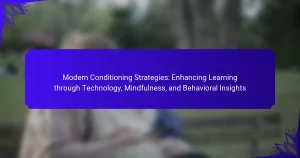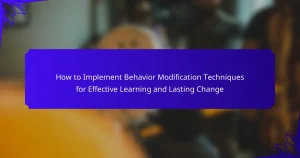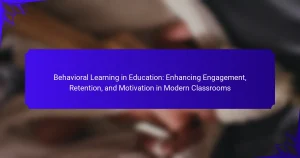Enhancing cognitive conditioning can significantly improve memory, focus, and learning retention. This article explores techniques such as spaced repetition, mindfulness practices, and active learning. It also examines the impact of environmental factors and common mistakes to avoid. Additionally, it highlights rare methods like neurofeedback and tDCS for optimizing cognitive performance.
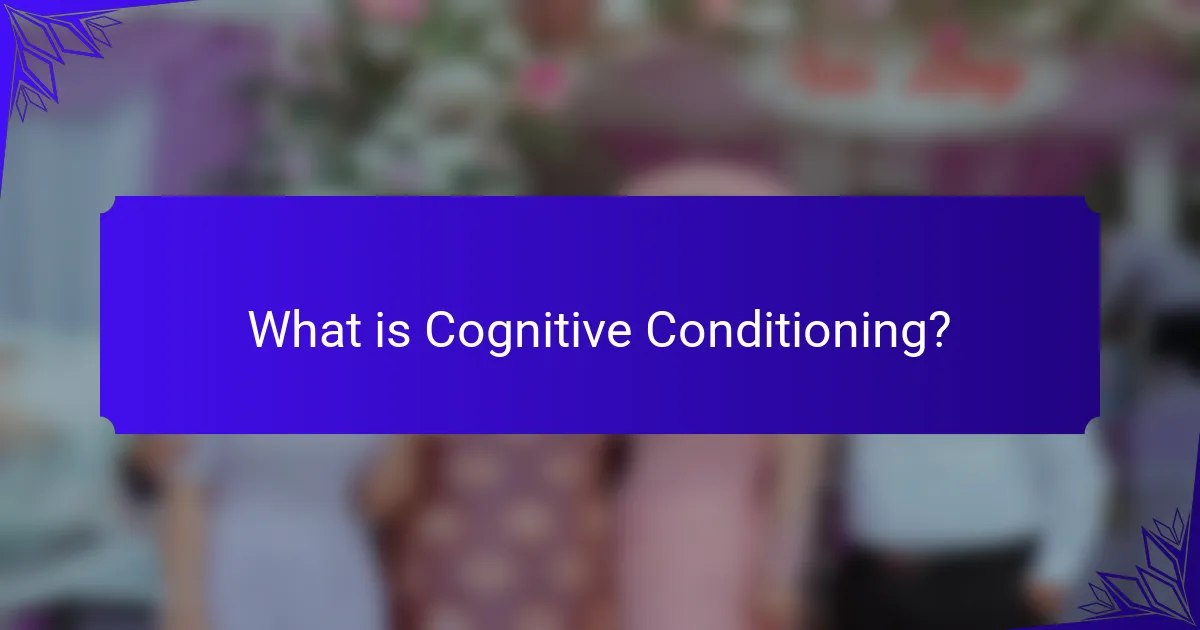
What is Cognitive Conditioning?
Cognitive conditioning enhances memory, focus, and learning retention through specific techniques. Techniques include spaced repetition, mindfulness practices, and cognitive behavioral strategies. Spaced repetition optimizes information recall by revisiting material at increasing intervals. Mindfulness enhances focus by training attention and reducing distractions. Cognitive behavioral strategies reshape thought patterns, improving learning processes. Each technique uniquely contributes to cognitive conditioning, resulting in improved mental performance.
How does cognitive conditioning influence memory and learning?
Cognitive conditioning significantly enhances memory and learning by reinforcing neural pathways. Techniques such as spaced repetition, positive reinforcement, and mindfulness can improve focus and retention. Spaced repetition helps combat forgetting by revisiting information at optimal intervals, while positive reinforcement encourages engagement and motivation. Mindfulness practices, such as meditation, enhance cognitive flexibility and attention control, leading to better learning outcomes.
What are the key components of cognitive conditioning?
The key components of cognitive conditioning include reinforcement, stimuli, and responses. Reinforcement strengthens the connection between stimuli and responses, enhancing learning. Stimuli can be external or internal cues that trigger specific behaviors. Responses are the actions or behaviors that result from these stimuli. Together, these components facilitate improved memory, focus, and learning retention.
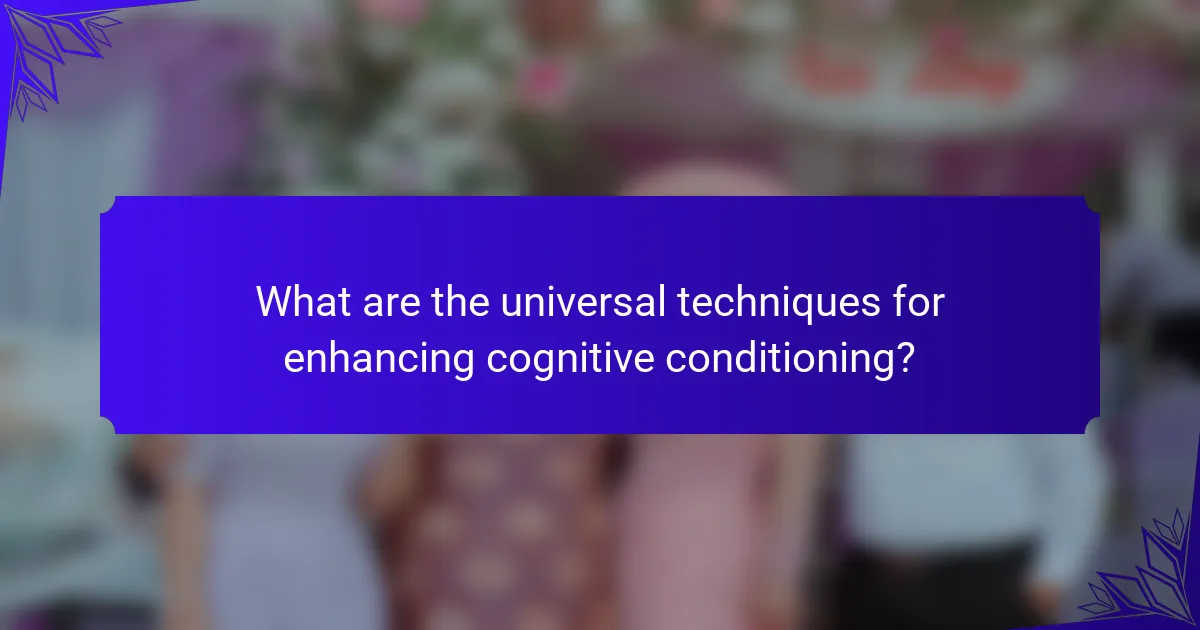
What are the universal techniques for enhancing cognitive conditioning?
To enhance cognitive conditioning, employ techniques like spaced repetition, mindfulness meditation, and active learning. These methods improve memory, focus, and learning retention effectively.
Spaced repetition involves reviewing material at increasing intervals, which strengthens memory recall. Mindfulness meditation enhances concentration and reduces distractions, fostering a clearer mind. Active learning engages individuals in the process, promoting deeper understanding and retention of information.
Incorporating these techniques can lead to significant improvements in cognitive performance and overall learning outcomes.
How does spaced repetition improve memory retention?
Spaced repetition significantly enhances memory retention by optimizing the timing of information review. This technique leverages the spacing effect, where information is recalled more effectively when it is studied over increasing intervals. Research shows that spaced repetition can improve long-term retention rates by up to 50% compared to traditional study methods. As learners encounter material at strategically spaced intervals, they reinforce neural connections, making retrieval easier and more efficient. This method not only aids in memorization but also supports deeper understanding, fostering a more robust cognitive framework for learning.
What role does active recall play in learning?
Active recall significantly enhances learning by promoting deeper engagement with material. This technique involves actively retrieving information from memory, which strengthens neural connections and improves retention. Research shows that students who utilize active recall outperform those relying solely on passive review methods. This approach encourages critical thinking and reinforces understanding, making it a unique attribute of effective learning strategies. By integrating active recall into study routines, learners can achieve better focus and longer-lasting memory retention.
How can visualization techniques enhance focus?
Visualization techniques significantly enhance focus by creating mental imagery that sharpens concentration. These techniques help individuals visualize goals, processes, or concepts, leading to improved cognitive engagement. For instance, imagining a successful outcome can motivate and direct attention towards tasks, while visualizing complex information can aid in retention and understanding. As a result, incorporating visualization into daily routines can transform focus and learning efficiency.
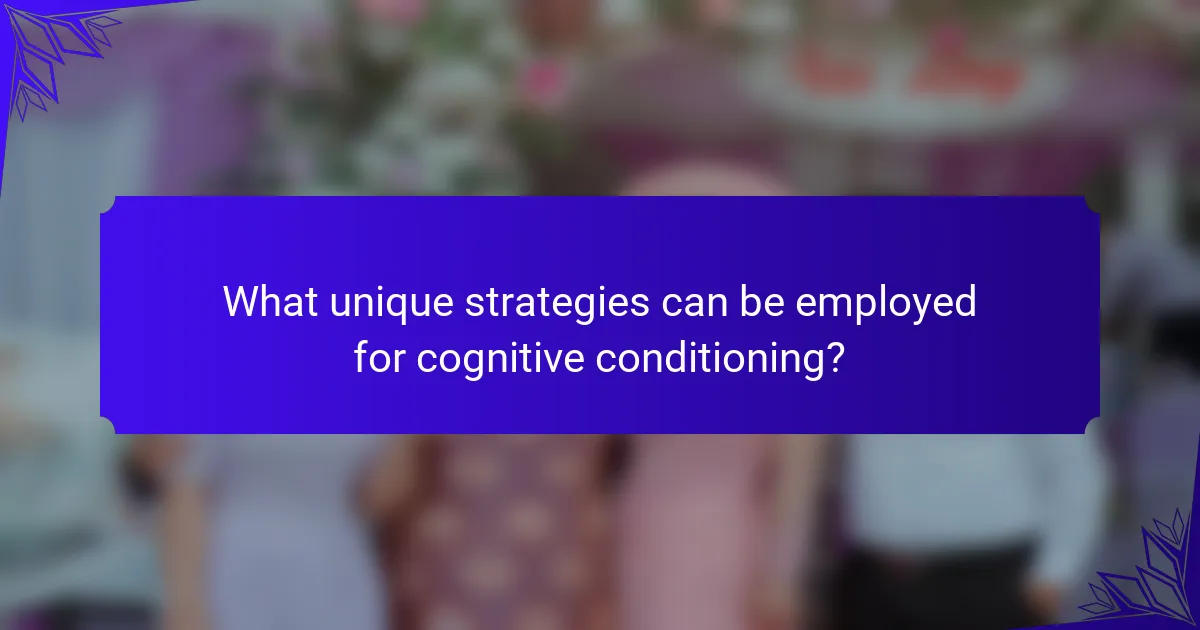
What unique strategies can be employed for cognitive conditioning?
To enhance cognitive conditioning, employ strategies like spaced repetition, mindfulness meditation, and dual coding. Spaced repetition optimizes memory retention by revisiting material at increasing intervals. Mindfulness meditation improves focus and reduces cognitive load, enhancing learning efficiency. Dual coding combines verbal and visual information, reinforcing understanding through multiple channels.
How does gamification impact learning and retention?
Gamification significantly enhances learning and retention by increasing engagement and motivation. It incorporates game elements, such as points and challenges, which make learning experiences more interactive and enjoyable. This approach fosters a deeper connection with the material, leading to better memory retention.
Research indicates that gamification can improve retention rates by as much as 30%. By providing immediate feedback and rewards, learners are encouraged to revisit and engage with content more frequently. This repeated exposure solidifies knowledge and enhances cognitive conditioning.
Additionally, gamification facilitates personalized learning paths. Learners can progress at their own pace, which caters to individual needs and preferences. This tailored approach not only boosts confidence but also reinforces learning through practical application.
Incorporating gamification strategies, such as leaderboards and achievement badges, can create a sense of competition and community. This social aspect further motivates learners to participate actively, ultimately leading to improved outcomes in memory and focus.
What are the benefits of using technology in cognitive conditioning?
Using technology in cognitive conditioning enhances memory, focus, and learning retention through personalized feedback, interactive tools, and data-driven insights. These benefits lead to improved engagement and effectiveness in cognitive training programs. Personalized apps adapt to individual learning styles, optimizing the training experience. Interactive tools, such as gamified learning platforms, increase motivation and retention rates. Data-driven insights enable users to track progress, identify strengths, and target areas for improvement, fostering a more tailored approach to cognitive conditioning.
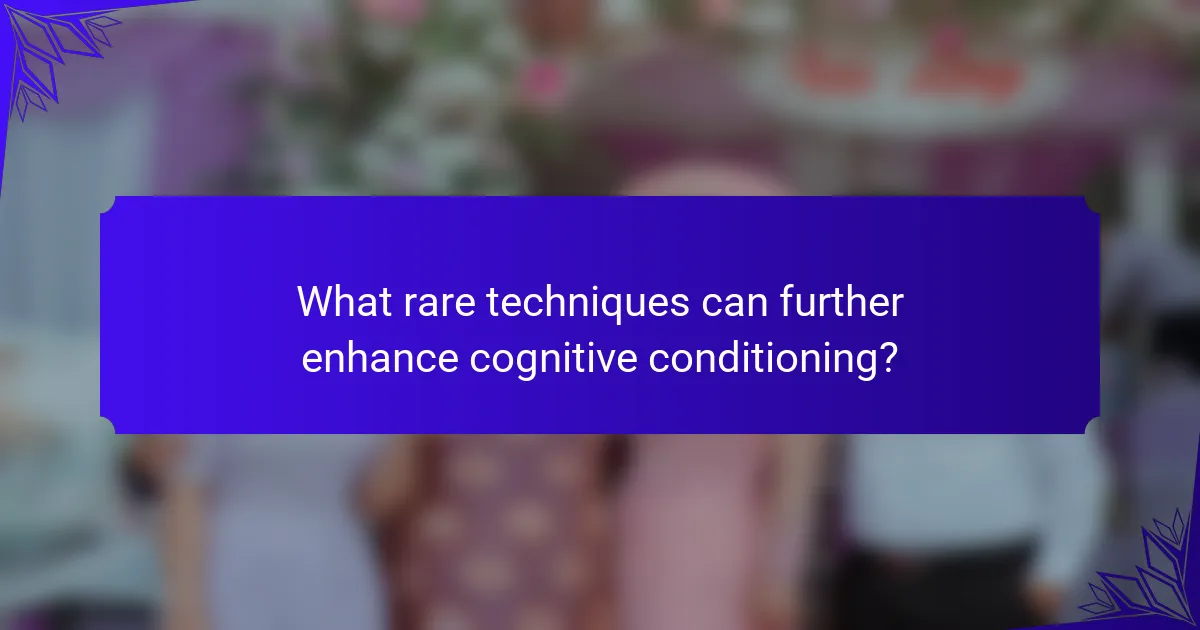
What rare techniques can further enhance cognitive conditioning?
To further enhance cognitive conditioning, consider rare techniques like neurofeedback, which trains brain activity, and transcranial direct current stimulation (tDCS), which modulates neural circuits. Both methods target specific cognitive functions, potentially increasing memory retention and focus. Neurofeedback involves real-time monitoring of brain waves, enabling users to improve mental performance through self-regulation. tDCS applies low electrical currents to the scalp, enhancing learning capabilities and decision-making processes. These techniques are gaining attention for their unique ability to optimize cognitive conditioning beyond traditional methods.
How does neurofeedback training work?
Neurofeedback training enhances cognitive conditioning by using real-time brain activity feedback to teach self-regulation of brain function. This technique involves sensors placed on the scalp that monitor brain waves, providing participants with immediate feedback through visual or auditory cues. As a result, individuals learn to modify their brain activity, improving memory, focus, and learning retention. Research indicates that neurofeedback can lead to significant improvements in cognitive performance by promoting optimal brain states for learning.
What are the implications of biohacking for cognitive enhancement?
Biohacking can significantly enhance cognitive conditioning through methods that improve memory, focus, and learning retention. These techniques often include nootropics, dietary changes, and mindfulness practices.
Nootropics, or smart drugs, can boost cognitive functions such as memory and creativity. For example, substances like caffeine and L-theanine enhance alertness while reducing anxiety. Dietary changes, including omega-3 fatty acids and antioxidants, support brain health and improve cognitive performance.
Mindfulness practices, such as meditation, have shown to increase focus and retention by promoting neuroplasticity. This ability to adapt and reorganize neural pathways is crucial for effective learning.
Incorporating these biohacking techniques can lead to measurable improvements in cognitive abilities, making them valuable for individuals seeking to enhance their mental performance.
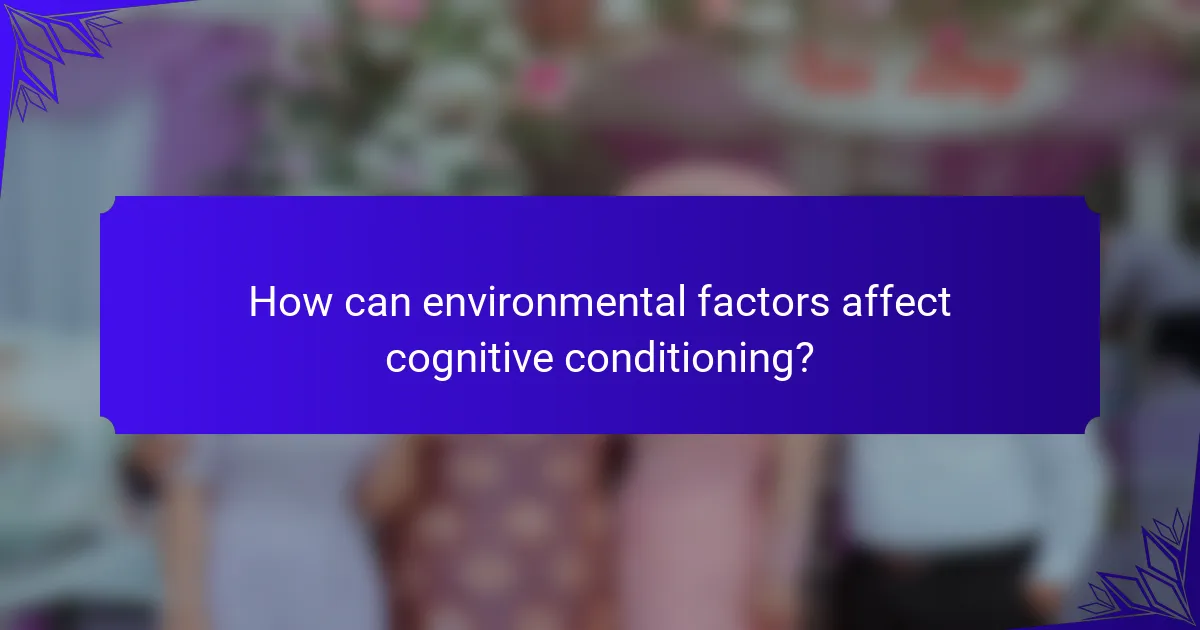
How can environmental factors affect cognitive conditioning?
Environmental factors significantly influence cognitive conditioning by affecting memory, focus, and learning retention. Factors such as noise, lighting, and temperature can enhance or hinder cognitive performance. For example, moderate ambient noise may boost creativity, while extreme temperatures can distract and reduce focus. Additionally, exposure to natural environments has been shown to improve attention span and cognitive flexibility. Understanding these factors allows individuals to optimize their surroundings for better cognitive conditioning outcomes.
What is the impact of physical space on focus and learning?
Physical space significantly influences focus and learning by shaping the environment where cognitive activities occur. Factors such as lighting, noise levels, and furniture arrangement affect attention and retention. For example, well-lit and quiet spaces enhance concentration, while cluttered environments can hinder learning. Research indicates that natural elements, like plants, can improve cognitive function and reduce stress, further supporting effective learning. Creating optimal physical spaces can lead to better academic performance and increased engagement in learning activities.
How does social interaction influence cognitive conditioning?
Social interaction significantly enhances cognitive conditioning by fostering memory retention and focus. Engaging with others stimulates brain activity, leading to improved learning outcomes. Collaborative environments encourage diverse perspectives, which can deepen understanding and retention of information. Studies show that social learning contexts can increase motivation and cognitive engagement, resulting in better performance in memory tasks.
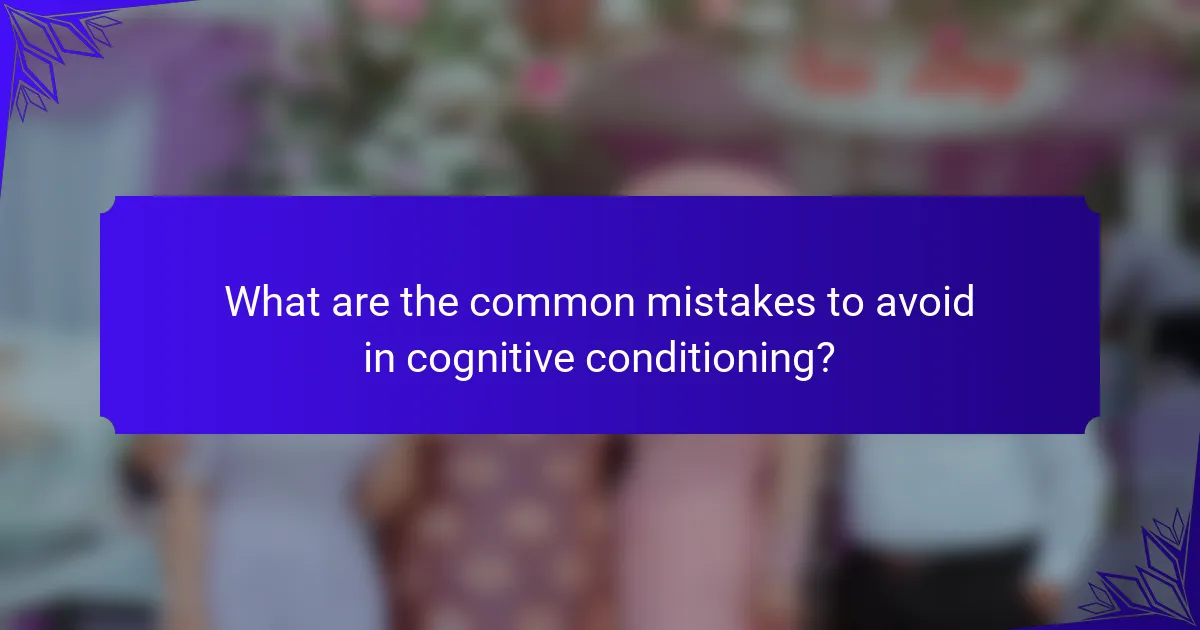
What are the common mistakes to avoid in cognitive conditioning?
To enhance cognitive conditioning, avoid common mistakes that hinder memory and focus. Key errors include neglecting regular practice, underestimating the importance of a conducive environment, and failing to set specific goals.
1. Inconsistent practice limits progress and retention.
2. Distractions in the environment reduce focus and effectiveness.
3. Vague goals lead to unclear outcomes and lack of motivation.
4. Ignoring breaks can cause mental fatigue and decreased performance.
5. Overloading information without adequate processing time hampers memory consolidation.
How can overloading information hinder learning?
Overloading information can significantly hinder learning by overwhelming cognitive capacity. When learners encounter excessive data, they struggle to process and retain key concepts. This can lead to confusion and decreased focus. Research indicates that cognitive overload impairs memory retention and critical thinking skills, making it essential to present information in manageable chunks. Effective techniques for enhancing cognitive conditioning include prioritizing relevant information and using spaced repetition to reinforce learning.
What are the pitfalls of neglecting breaks during study?
Neglecting breaks during study can lead to decreased focus, reduced retention, and cognitive fatigue. Continuous study without pauses overwhelms the brain, impairing its ability to process and store information efficiently. Research indicates that taking regular breaks enhances learning by allowing the brain to consolidate knowledge and rejuvenate attention. For optimal cognitive conditioning, incorporate short breaks every 25 to 50 minutes to maintain peak performance and improve memory retention.
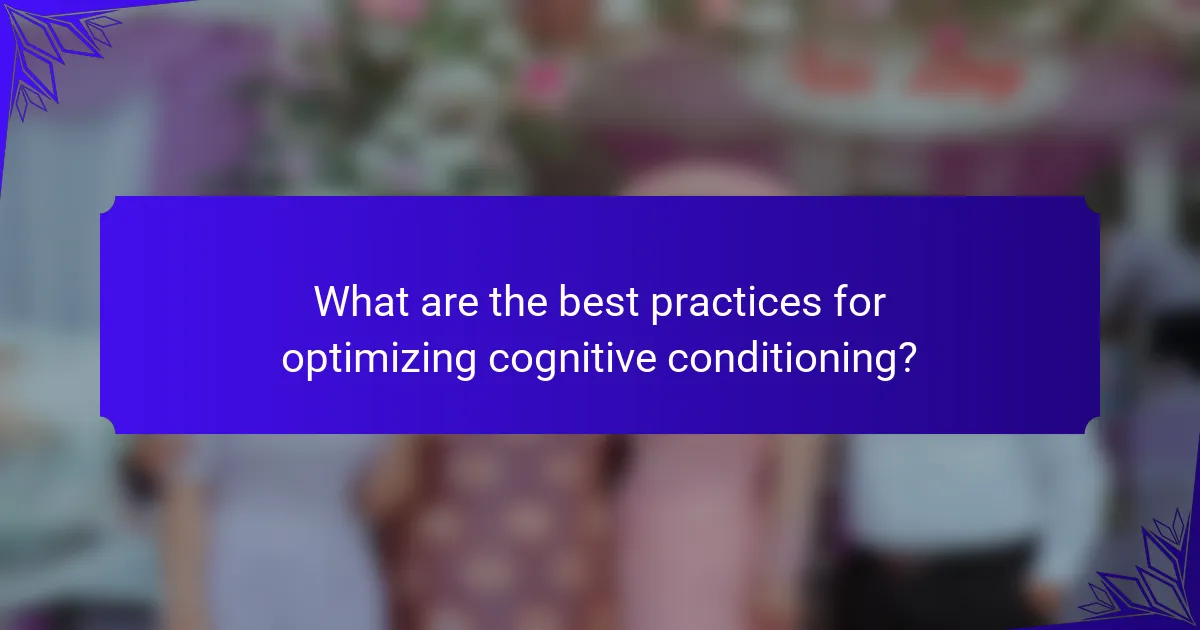
What are the best practices for optimizing cognitive conditioning?
To optimize cognitive conditioning, focus on techniques that enhance memory, concentration, and learning retention. Incorporate regular mental exercises, maintain a balanced diet, and ensure adequate sleep.
Engagement in activities like puzzles or memory games can significantly boost cognitive function. Mindfulness practices, such as meditation, improve focus and reduce distractions.
Establishing a consistent routine aids in reinforcing learning patterns, while utilizing mnemonic devices can enhance memory recall. Regular physical exercise is also vital, as it promotes overall brain health.
Lastly, social interactions stimulate cognitive processes, fostering better retention and understanding of information.
How can a personalized learning plan enhance retention?
A personalized learning plan enhances retention by tailoring educational experiences to individual needs. This approach increases engagement and motivation, leading to improved memory retention. Research shows that customized strategies, such as spaced repetition and varied content delivery, significantly boost learning outcomes. Personalization also allows for the identification of unique learning styles, optimizing cognitive conditioning. As a result, learners can better focus on material relevant to their interests and strengths, fostering deeper understanding and long-term retention.
What role does regular assessment play in cognitive growth?
Regular assessment is crucial for cognitive growth as it enhances memory, focus, and learning retention. Assessments provide feedback, identify strengths and weaknesses, and guide learning strategies. This iterative process fosters a growth mindset, encouraging learners to adapt and improve. Regular evaluations can also track progress, ensuring that cognitive conditioning techniques remain effective. Engaging in consistent assessments can lead to deeper understanding and mastery of concepts, ultimately contributing to overall cognitive development.
How can mindfulness techniques be integrated effectively?
Mindfulness techniques can be effectively integrated through structured practice and consistent application. Start by setting specific goals for mindfulness, such as improving focus or reducing stress. Incorporate techniques like focused breathing, body scans, and mindful observation into daily routines to enhance cognitive conditioning.
Practicing mindfulness for just a few minutes daily can significantly boost memory retention and concentration. As a unique attribute, research shows that mindfulness can increase gray matter density in brain regions related to memory and learning. This integration fosters a supportive environment for cognitive growth.
What are the expert insights on maintaining focus in a digital age?
To maintain focus in a digital age, experts recommend implementing structured techniques that enhance cognitive conditioning. Techniques such as the Pomodoro Technique, mindfulness meditation, and regular exercise significantly improve memory, focus, and learning retention.
Research indicates that short, focused work sessions followed by breaks enhance concentration. Mindfulness practices help reduce distractions, enabling deeper engagement with tasks. Regular physical activity is linked to improved cognitive function and attention span.
Incorporating these strategies into daily routines can lead to significant improvements in productivity and mental clarity. Adapting to a digital environment requires intentional focus management to combat the constant influx of information and interruptions.
